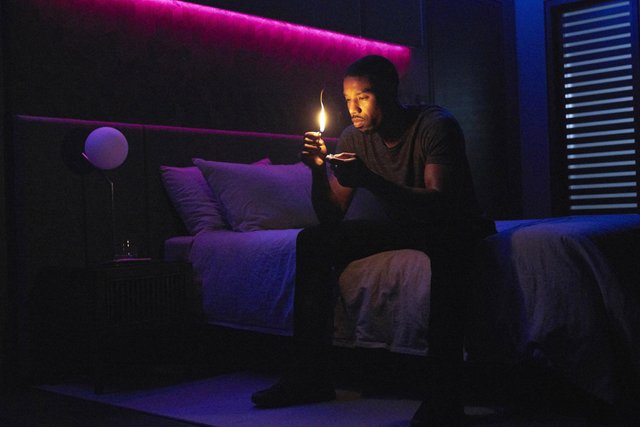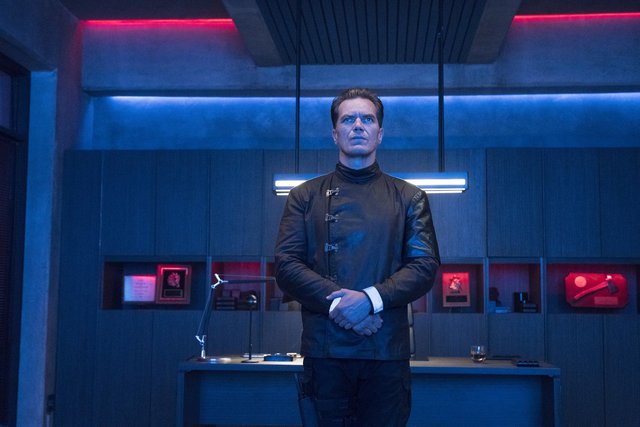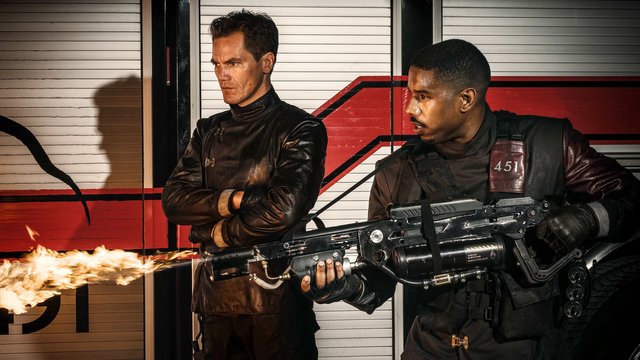
Guy Killmonger… Erik Montag… If you burn the screenwriters of this movie, I'm not going to blame you. | Source: Rotten Tomatoes
Considered by many to be Ray Bradbury's masterpiece, Fahrenheit 451 (1953) has eventually earned a place of honor among the best-written dystopias in science fiction literature. There is not a lack of versions about what inspired the legendary American science fiction writer to create it, but almost everyone agree on one point: book burning as an agent of disruption and elimination of dissenting voices and free thought, in various cultures and historical periods, powerfully influenced the author.
Bradbury's steady pulse did not falter when it came to using this image as an allegory to the metamorphosis already experienced by culture in the 1950s, where it was already evident that literature was being rapidly displaced by the emergence of mass media, such as radio and television, at generating and expanding consciousness and ideas. A civilization on the verge of war and apocalypse, where the work of firefighters was not to prevent fires, but to cause them, and the masses had been idiotized and tamed on the basis of novel forms of entertainment that would end up becoming ubiquitous, quickly became a harsh omen of times to come that was received with universal acclaim by both critics and the literary community.
In 1966, thirteen years after the novel's publishing, the icon of French cinematography, François Truffaut, directed a film adaptation of the novel that was also his only English-language film ever. With Oskar Werner and Julie Christie in the main cast, and translating the book to screen himself with the help of Jean-Louis Richard, Truffaut produced a movie that, although it would be warmly received by both audiences and critics, would later become a cult film that inspired directors of the stature of Martin Scorsese, and that even Ray Bradbury himself would end up praising in several of his later interviews.
Fifty-one years later, in 2017, HBO Films, the film division of what for many is still the best producer of original content for television, announces its intentions to produce an updated version of Bradbury's work to be premiered at the Cannes Film Festival the following year, on May 12, and then go live to television and Internet streaming a week later. Directed by Iranian-American Ramin Bahrani, with a cast that had great and fresh names on it, plus all the prestige and power of HBO, said news would delight old and new generations, curious to see how they would adapt the novel at a time when its content, sadly, has ceased to be visionary to become relentlessly contemporary.
Finally, on May 2018, the movie premiered on Cannes…
… and reactions couldn't be more mixed.
.jpg)
Fahrenheit 451 (2018), like the novel and its first film adaptation, stars Guy Montag, a member of the Cleveland Fire Department - an important change from the novel, whose setting is non-specific - particularly effective in his work. Considered a hero and celebrity both in his squadron and in his city, Montag is the poster boy of an authoritarian administration that blames literature and other art forms for causing mental upheaval, discontent and antisocial attitudes in those who come into contact with them. With the strong influence, not only of his captain, John Beatty, but of his father's, Granger Montag, memories - who at the time was as notorious as Guy, but whom the film will gradually show that he was not who he appeared to be - Montag will appear to be on a honeymoon with his flamethrower...
... at least until the appearance of a girl who serves as Beatty's regular informant in the pursuit of state dissidents - readers and guardians of books known as "Eels" - as well as the appearance of events that will bring him into contact with what he wanted so badly to destroy, send Cleveland's star firefighter on a rediscovery trail that will turn him from victimizer to victim and fugitive from justice.
If you have read the novel before, or seen its previous cinematographic adaptation, much of this synopsis will sound justifiably strange to you. It is self-evident, in the first minutes of this millenium's Fahrenheit 451, that its creators have wanted to use the enormous power of the metaphor contained in its general plot to attack another kind of circumstances and villainy. At a time when not only the majority of the world's enlightened population is familiar with the subject matter of the novel - whether they have read it or not - but their writer's worst fears have become an overwhelming reality, this new adaptation simply could not be more of the same.
Although the fear of a massified and enraptured global culture compelled Bradbury to write the 1953 novel, and the anxiety about the bureaucracy and boredom of the structured post-war life was the driving force behind Truffaut's 1966 film adaptation, what moves Bahrani in 2018 is a purely modern problem: the omnipresence of social networks, the emergence of fake news, and the ease with which any John Doe can become a celebrity - even if he is performing the most deplorable acts imaginable on camera - quickly become the philosophical basis with which the Iranian-American filmmaker intends to update this beloved science fiction classic to our times.
A strategy that initially works wonders...
... until everything falls apart in the second act of the film.

Michael Shannon's face in the majority of the movie's production photos appears to be prophetic of its reception. No, really. | Source: Rotten Tomatoes
It cannot be said that Fahrenheit 451 fails as a film because of its performances: truth be told, most of the actors are quite good in their roles. Michael B. Jordan has already shown, in films as apparently dissimilar as Creed and Black Panther, that he can be the driving force of a film with ease, either as the hero or the antagonist - and in this film he plays both quite nicely -. On the other hand, Michael Shannon, who in yours truly's humble opinion is one of the best actors of present times, does a performance so outstanding that seems effortless as the captain of Montag's squadron, and future commissioner of the entire fire brigade, of whom we discover that he has as many or worse secrets than those that Montag ends up accumulating during the plot's shenaningans.
Perhaps the true surprise of the film in the acting front is Sofia Boutella, who is determined to demonstrate, with a knack for picking interesting and fresh roles, that she is much more than the graceful and lethal murderer Gazelle, from Kingsman: The Secret Service. Being able to act and stand up to her cast mates naturally is a refreshing sight after having seen her so poorly used in her previous high-profile films, Star Trek Beyond and The Mummy_, and it's especially motivating to see her maintaining the good level of her short but shocking appearance in Atomic Blonde. Nevertheless, her contribution to Fahrenheit 451 is just as unfairly short and almost wasted as in the aforementioned film.
The performance of the supporting actors does end up being somewhat irregular; although anecdotal appearances such as those of Keir Dullea - the legendary astronaut David Bowman, from 2001: A Space Odyssey - as a clandestine compiler of books and stories, and Lilly Singh - a Canadian youtuber whose casting reinforces the suspicions of where this modern adaptation is going - are appreciated, the rest of the cast seems to be there only to reinforce the drama experienced by the trio of Jordan, Shannon and Boutella in their respective roles.
Now, the script... oh, by Cthulhu, the script.
Never before has an attempt to modernise the intellectual content of a work been burnt out so quickly.

Burn it, Montag, burn it… The Handmaid’s Tale, this film is not. | Source: Rotten Tomatoes
To no one's surprise, Hollywood, at this moment, is the center of a heated cultural war where the content of its productions has become more and more political by the day. The mediatic wanderings of the current president of the United States of America, Donald Trump, as well as his increasingly unintelligible course of action in power and his firm attempt to become a champion of the incomprehension, stubbornness and poor empathy of the average American for those who think differently from him - that pink elephant in the room, that sleeping titan of American culture that has awakened in the form of the alt-right - has made him an easy target of an entertainment industry that has not hesitated to direct its weapons against him and the increasingly backward society of which he is now leader.
And it's no wonder that Fahrenheit 451, in its first act, strives to make extremely crude comments on U.S. and global present events. There is no shortage of high caliber bullets in this film, and Ramin Bahrani does not shy himself in shooting them; from a Montag that communicates with its fans through a social network of total access, as if it were a reality show star, to an educational system that has chosen, rather than analyzing and generating discussions about classics of literature, to synthesize them to the barebone and to show you "only what you need to know" - ouch, Wikipedia, ouch -, the first act of this adaptation attacks directly to the heart of a certain millenials' group, the one that was educated watching reality shows and following celebrities in Instagram.
Bahrani also makes a pretty decent attempt to create new questions in his adaptation, which, at least for people who haven't read the novel and may not remember Truffaut's version, will undoubtedly be seen as quite transgressive acts. Common fears of the post-war United States, such as the total surveillance of the government by its inhabitants, the disappearance of seditious factors and individuals from society and the total and absolute normalization of social behavior, are mixed with other, more modern ideas, such as the false and empty social activism promoted by certain networks since their creation or the ease with which modern man believes more what he reads on his smartphone than what he sees in the news. The worst fears of those who today live in Trump's Idiocracy, materialized just like that.
It's a pity that, at some point in the film, not only does the director end up proving that his adaptation of the original novel was very, very, very loose...
... but that he ends up forgetting the intensity and crudity of his original message.
In its second act, and especially at the climax of the film, so many alterations to the powerful plot of Bradbury's novel have been made in favour of creating surrealist and somewhat unnecesary sequences, where style seems to care more than substance, that the initial impact of the plot's modernisation is completely diluted. This fact, mixed with such a far removed ending sequence to the events which were so effectively captured in the book that makes you think why nobody told the producers "if it's not broken, don't fix it", turns Fahrenheit 451, instead of a denunciation of all the evils that afflict our culture in this millennium, into what seemingly is a fan-made film, one of those abridged versions conveniently made and published in the film's colleges and schools, where they don't show you what you should know....
... but what they think you need to know.
And that, at a time when it is so necessary for citizens worldwide to question the nature of the information they consume, is a disservice to the memory of a truly legendary and referential work of science fiction.
One that, at least for the time being, is better to re-read.
Thank you for reading this post!
I try to answer as many comments as possible, so, feel free to leave yours in the comment section! 👇
100% original content made by yours truly...

Hi bohemian.machine,
Visit curiesteem.com or join the Curie Discord community to learn more.
Downvoting a post can decrease pending rewards and make it less visible. Common reasons:
Submit
Great review, my darling! It's a pity that with such a powerful original idea, the film deviates from its purpose. The approach they had seemed very interesting to me; it's a shame the script was half done. I'll have to watch it!
Downvoting a post can decrease pending rewards and make it less visible. Common reasons:
Submit
Thank you, luv! ❤
Indeed, it's a true pity. This adaptation could easily have been the perfect movie to capture the zeitgeist of the 21st century 😪 Sadly, director Ramin Bahrani got entangled trying to bite more that he could chew... And the film's ending feels completely anticlimactic.
As a whole, Fahrenheit 451 is an embarrasing misstep for HBO 😞 Nevertheless, it warrants a view or two, so... I'll patiently wait for you to watch it!
Downvoting a post can decrease pending rewards and make it less visible. Common reasons:
Submit
Congratulations @bohemian.machine! You have completed the following achievement on the Steem blockchain and have been rewarded with new badge(s) :
Click on the badge to view your Board of Honor.
If you no longer want to receive notifications, reply to this comment with the word
STOPDo not miss the last post from @steemitboard:
Downvoting a post can decrease pending rewards and make it less visible. Common reasons:
Submit